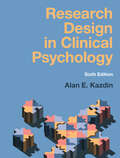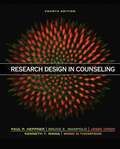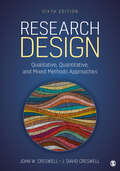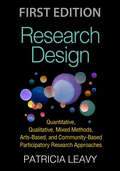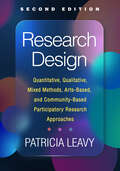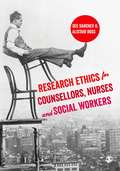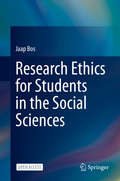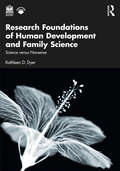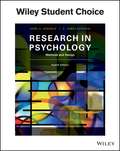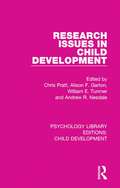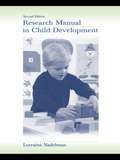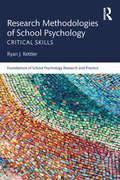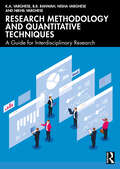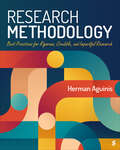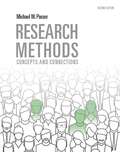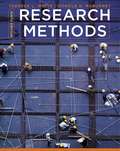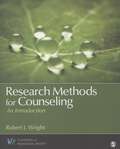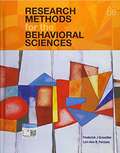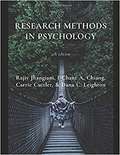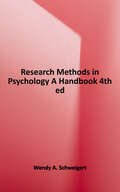- Table View
- List View
Research Design in Clinical Psychology
by Alan E. KazdinGain a thorough understanding of the entire research process – developing ideas, selecting methods, analyzing and communicating results – in this fully revised and updated textbook. The sixth edition comprises the latest developments in the field, including the use of technology and web-based methods to conduct studies, the role of robots and artificial intelligence in designing and evaluating research, and the importance of diversity in research to inform results that reflect the society we live in. Designed to inspire the development of future research processes, this is the perfect textbook for graduate students and professionals in research methods and research design in clinical psychology.
Research Design in Clinical Psychology (Fifth Edition)
by Alan E. Kazdin<P>The purpose of this text is to describe and explain research methods in clinical psychology but the issues and methods are relevant to other areas as well, such as counseling, educational, health, and school psychology, psychiatry, social work, and nursing. <P>The topics within each of these areas span theory, research, and application.
Research Design in Counseling
by Bruce E. Wampold Thompson Jesse Owen Puncky Paul Heppner Kenneth T. WangWith enlightening examples and illustrations drawn from counseling literature, RESEARCH DESIGN IN COUNSELING, 4th Edition facilitates a conceptual understanding of research design as well as the important role of science in counseling and counseling psychology today. In doing so, the text fully addresses the strengths and weaknesses of all of the major designs, and focuses on a broad array of methodological issues. <p><p>In addition to introducing students to the existing scientific literature in counseling and counseling psychology, the authors address professional writing, ethics, and research training. Their evenhanded approach provides students with an understanding of the various types of research, including both quantitative and qualitative approaches. Writing more than just a how-to book, the authors present a compelling rationale for the necessity of conducting research, and persuasively promote the necessity for greater integration of science and practice to enhance the effectiveness of both science and practice in counseling and counseling psychology.
Research Design in Counseling (3rd edition)
by P. Paul Heppner Bruce E. Wampold Dennis M. KivlighanThis book, with enlightening examples and illustrations drawn from counseling literature, fully addresses the common problems that confront counseling researchers.
Research Design: Qualitative, Quantitative, and Mixed Methods Approaches
by John W. Creswell J. David CreswellThe Sixth Edition of the bestselling Research Design: Qualitative, Quantitative, and Mixed Methods Approaches provides clear and concise instruction for designing research projects or developing research proposals. This user-friendly text walks readers through research methods, from reviewing the literature to writing a research question and stating a hypothesis to designing the study. At each step in the process, authors John W. Creswell and J. David Creswell address qualitative, quantitative, and mixed methods approaches to encourage readers to choose the approach that best fits the research question. The Sixth Edition has been fully revised to reflect the 7th edition of the Publication Manual of the American Psychological Association with more inclusive language, updated citation styles, and updated writing suggestions. Updates reflect the latest developments in mixed methods and new research examples throughout help capture and demonstrate new trends in research. Included with this title: LMS Cartridge: Import this title’s instructor resources into your school’s learning management system (LMS) and save time. Don’t use an LMS? You can still access all of the same online resources for this title via the password-protected Instructor Resource Site. Learn more.
Research Design: Qualitative, Quantitative, and Mixed Methods Approaches
by John W. Creswell J. David CreswellThe Sixth Edition of the bestselling Research Design: Qualitative, Quantitative, and Mixed Methods Approaches provides clear and concise instruction for designing research projects or developing research proposals. This user-friendly text walks readers through research methods, from reviewing the literature to writing a research question and stating a hypothesis to designing the study. At each step in the process, authors John W. Creswell and J. David Creswell address qualitative, quantitative, and mixed methods approaches to encourage readers to choose the approach that best fits the research question. The Sixth Edition has been fully revised to reflect the 7th edition of the Publication Manual of the American Psychological Association with more inclusive language, updated citation styles, and updated writing suggestions. Updates reflect the latest developments in mixed methods and new research examples throughout help capture and demonstrate new trends in research. Included with this title: LMS Cartridge: Import this title’s instructor resources into your school’s learning management system (LMS) and save time. Don’t use an LMS? You can still access all of the same online resources for this title via the password-protected Instructor Resource Site. Learn more.
Research Design: Quantitative, Qualitative, Mixed Methods, Arts-Based, and Community-Based Participatory Research Approaches
by Patricia LeavyThis user-friendly book provides a step-by-step guide to using the five major approaches to research design: quantitative, qualitative, mixed methods, arts-based, and community-based participatory research. Chapters on each approach follow a unique format--they present a template for a research proposal and explain in detail how to conceptualize and fill in every section. Terminology commonly used within each approach is identified, and key moments of ethical decision making are flagged. Interdisciplinary research examples draw on current events and social justice topics. Unique coverage includes hot topics: replication studies and data sharing, tailoring proposals to different audiences, and more. The book also includes a general introduction to social research; an in-depth, practical discussion of ethics; and a chapter on how to begin a research study, from planning a topic to developing a research question via a literature review. Pedagogical Features *Multiple "Review Stops" in each chapter--quick quizzes with answer keys. *End-of-chapter writing exercises, research activities, and suggested resources. *Bold-face key terms and an end-of-book glossary. *Boxed tips from experts in the respective approaches. *Supplemental PowerPoint slides for instructors using the book in a class.
Research Design: Quantitative, Qualitative, Mixed Methods, Arts-Based, and Community-Based Participatory Research Approaches
by Patricia LeavyWith a new chapter on the literature review, this accessible step-by-step guide to using the five major approaches to research design is now in a thoroughly revised second edition. The prior edition's user-friendly features are augmented by a new companion website with worksheets keyed to each chapter. For each approach, the text presents a template for a research proposal and explains how to conceptualize and fill in every section. Interdisciplinary research examples draw on current events and social justice issues. Unique coverage includes hot topics--replication studies, data sharing, and preregistration; tailoring proposals to different audiences; and more. Terminology commonly used in each approach is identified and key moments of ethical decision making are flagged. The book includes a general introduction to social research, an in-depth discussion of ethics, and a chapter on how to begin a research study. New to This Edition New or expanded discussions of theory and literature in quantitative research, replication studies, preregistration of research, the critical paradigm in qualitative research, mixed methods research, approaching different kinds of organizations in community-based participatory research, and more. Chapter on the literature review, including the ethics of citational practices. Companion website with worksheets to aid in learning and practicing each chapter's key concepts. Updated examples, references, and recommended readings throughout. Pedagogical Features Multiple "Review Stops" in each chapter--quick quizzes with answer keys. End-of-chapter writing exercises, research activities, and suggested resources. Bolded key terms and an end-of-book glossary. Boxed tips from experts in the respective approaches. Pointers to downloadable worksheets throughout the chapters. Author-created PowerPoints and chapter tests with answer keys available to instructors using the book in a course.
Research Ethics for Counsellors, Nurses & Social Workers
by Dee Danchev Alistair RossResearch Ethics for Counsellors, Nurses & Social Workers is designed to help you make the best start in your research career. With ethical implications and considerations arising at each stage of the research process, engaging with the wide range of issues and ideas can often prove a challenge. Dee Danchev and Alastair Ross will help you overcome this challenge and become confident, skilled researchers by providing you with: -An in-depth explanation of the theoretical base for a range of ethical demands and approaches, equipping you with the tools to make the right decisions for your project. -Key research ethics findings so students can apply the latest thinking to your research practice. -Short case examples and checklists to help you apply theory to practice and reflect on what you have learned. -Further reading and important resources to support your continued learning. Whether you are an experienced researcher or coming to research for the first time, this highly practical, step by step guide, is a must for your bookshelf. Dee Danchev is a counselling psychologist and Pastoral Advisor at Nuffield College, Oxford. Alistair Ross is Director of Psychodynamic Studies and Dean of Kellogg College, Oxford.
Research Ethics for Students in the Social Sciences
by Jaap BosThis open access textbook offers a practical guide into research ethics for undergraduate students in the social sciences. A step-by-step approach of the most viable issues, in-depth discussions of case histories and a variety of didactical tools will aid the student to grasp the issues at hand and help him or her develop strategies to deal with them. This book addresses problems and questions that any bachelor student in the social sciences should be aware of, including plagiarism, data fabrication and other types of fraud, data augmentation, various forms of research bias, but also peer pressure, issues with confidentiality and questions regarding conflicts of interest. Cheating, ‘free riding’, and broader issues that relate to the place of the social sciences in society are also included. The book concludes with a step-by-step approach designed to coach a student through a research application process.
Research Foundations of Human Development and Family Science: Science versus Nonsense
by Kathleen D. DyerHuman Development and Family Science (HDFS) is an interdisciplinary and applied field that draws from developmental science, family science, and other social sciences. Research Foundations of Human Development and Family Science is a textbook that provides an introduction to the diverse scientific research methods that form the foundation of scholarship and practice in HDFS. In Part I, Kathleen D. Dyer explores science. She distinguishes empirical scientific research from common sense and from knowledge gained from personal experience. This section also includes a discussion of the strategies used by pseudoscience to exploit the well-deserved credibility of science, providing relevant examples. Part II examines systematic empiricism through sampling and measurement. HDFS scholars use a wide array of measurement tools, including self-report (interviews, questionnaires, and self-report tasks), observations (participant, naturalistic, and structured), objective tests, physiological measures, and several types of archival records. Part III introduces the use of study design to achieve falsifiability in scientific research, including an overview of various orientations to time used in research as well as four different study designs: qualitative, prevalence, correlational, and experimental. Finally, Part IV addresses the public verifiability of science, including how scientific consensus is developed, the use of literature reviews to identify convergence of evidence, and how scientific literacy translates into evidence-based professional practice. Illustrated throughout with studies foundational to the discipline as examples of the strategies described in the text, Research Foundations for Human Development and Family Science is a comprehensive, accessible core textbook for undergraduate research methods classes in HDFS. It introduces the discipline of HDFS and challenges students to understand the limitations of common sense and the threat of pseudoscience for those work professionally with children and families.
Research In Psychology Methods and Design
by C. James Goodwin Kerri A. GoodwinAn approachable, coherent, and important text, Research in Psychology: Methods and Design, 8th Edition continues to provide its readers with a clear, concise look at psychological science, experimental methods, and correlational research in this newly updated version. <P><P>Rounded out with helpful learning aids, step-by-step instructions, and detailed examples of real research studies makes the material easy to read and student-friendly.
Research In Rehabilitation Counseling: A Guide To Design, Methodology, And Utilization
by James L. Bellini Phillip D. RumrillResearch In Rehabilitation Counseling: A Guide To Design, Methodology, And Utilization
Research Issues in Child Development (Psychology Library Editions: Child Development #11)
by William E. Tunmer Chris Pratt Alison F. Garton Andrew R. NesdaleFirst published in 1986, this authoritative book contains a selection of original, research based, reports of studies conducted in Australia and New Zealand in the field of Child Development. The topics have been arranged into four major sections – cognitive issues in development, language and reading development, perpetual motor development and social aspects of development. Both pure and applied research issues are presented, and the chapters cover child development from infancy to adolescence. The book’s special strength lies in the diversity of topics tackled and the range of developmental research represented. Theoretical viewpoints are raised and empirical questions answered in the studies reported. The editors have systematically drawn together important contributions which reflected contemporary topics in child development at the time. Although no one common theoretical or empirical theme unites either each section or the whole book (which reflects the general scope and diversity of child development in the 1980s), the contributors in general see the child as developing through active interaction with his or her environment. This interactionist position is clearly preferred by most researchers, who realised that simplistic genetic or environmental models are inadequate to explain the complex development of the child. The editors were all active researchers in the area of child development at the time and each co-authored a chapter in the book. All published regularly in national and international journals and books, and were aware of current developments in their main areas of expertise. All those interested in issues in child development will find this book important reading, as it provides the reader with an excellent and diverse selection of studies, bearing on a wide range of empirical research.
Research Manual in Child Development
by Lorraine NadelmanThis unique hands-on lab manual in child development provides great ideas and resources for teaching research courses involving child subjects. It includes projects in psychomotor/perceptual, cognitive, and social development. Projects are preceded by background essays on the history of that topic, related research, theoretical issues, and controversies. Each project has hypotheses to test, detailed procedures to follow, all stimuli, individual and group data sheets, empty tables, suggested statistics, discussion questions, and an updated bibliography. Special features of this second edition: *The introductory text portion details research considerations, including an introduction to psychological research, sections on developmental research, children as subjects, and general experimental research procedures. *The popular Infant Observation project has the student visit homes with babies for a semester and provides practice in observational data collection, reliability assessment, and report writing. *The cognitive development section includes two new subfields: Theory of Mind and Language--Children's Interpretation of the Word Big, in addition to classic studies of Piaget's spatial perspective-taking and attention and memory. The final chapter describes a suggested neuropsychological project. *The socialized child section includes a new study on sibling relationships as seen by the older or younger sibling, in addition to the earlier projects on self-esteem, sex identity, and cooperation-competition. The final section describes a suggested cross-cultural interview project.
Research Methodologies of School Psychology: Critical Skills (Foundations of School Psychology Research and Practice)
by Ryan J. KettlerResearch Methodologies of School Psychology is a comprehensive, actionable resource that offers graduate students and school psychologists the knowledge and skills to apply key scientific techniques in practice. A volume in the Foundations of School Psychology Research and Practice Series, this book directly addresses the need for definitive resources on mastering research methodologies in the field. Covering topics such as development and evaluation of measures, application of various designs, and drawing inferences from data, Ryan J. Kettler provides rigorous yet accessible methodological guidance. Each chapter includes illustrative examples, summaries of essential learnings, and reflective concluding questions. Using these engaging and invaluable strategies, graduate students and school psychologists will be effectively prepared to apply the scientific method in their own professional contexts.
Research Methodology and Quantitative Techniques: A Guide for Interdisciplinary Research
by K.A. Varghese B.R. Ranwah Nisha Varghese Nikhil VargheseResearch Methodology and Quantitative Techniques is a guide tailored for students and research scholars navigating the intricate landscape of research degrees across various disciplines.From clearing coursework to formulating research synopses, selecting methodologies, conducting analysis and penning impactful theses, this book is a roadmap for every stage of the research journey. It empowers scholars to undertake original, quality research that not only fulfills academic requirements but also contributes to the burgeoning pool of knowledge in diverse fields. Uniquely structured to address the specific needs of researchers, this guide goes beyond traditional boundaries, delving into areas like IPRs and research ethics often overlooked in discipline-oriented texts. By offering comprehensive support, from topic selection to publication, it aims to be the go-to resource for researchers seeking a seamless path from inception to dissemination.This book, Research Methodology and Quantitative Techniques, addresses every facet of research with clarity and insight and serves as both a companion and a vital tool for scholars poised to make a meaningful research impact in their fields.
Research Methodology: Best Practices for Rigorous, Credible, and Impactful Research
by Herman AguinisResearch Methodology: Best Practices for Rigorous, Credible, and Impactful Research takes a 360-degree view of understanding and doing research, helping readers become expert researchers, reviewers, and consumers of research. Renowned author, journal editor, and researcher Herman Aguinis distills the vast body of work on methodological best practices into a singular experience. Each of the 16 chapters thoroughly explains a different aspect of methodology step by step, from choosing useful and compelling research topics to reporting results accurately and credibly. Researchers at all career stages will find this text helpful to structure and conduct high-impact empirical research aimed at producing a thesis, dissertation, or journal publication. Research consumers will find instruction on how to evaluate the rigor and credibility of research conducted by others. Instructors will find the book’s modular approach refreshing by assigning students the most relevant topics—from checklists of best practices to an in-depth treatment of a methodology. Filled with "how-to’s" and "dos and don’ts", figures, hands-on exercises, and "Methods in Practice" boxes that summarize and apply best practices, this book is a must-have for anyone interested in producing or reading research. Included with this title: LMS Cartridge: Import this title’s instructor resources into your school’s learning management system (LMS) and save time. Don’t use an LMS? You can still access all of the same online resources for this title via the password-protected Instructor Resource Site. Learn more.
Research Methodology: Best Practices for Rigorous, Credible, and Impactful Research
by Herman AguinisResearch Methodology: Best Practices for Rigorous, Credible, and Impactful Research takes a 360-degree view of understanding and doing research, helping readers become expert researchers, reviewers, and consumers of research. Renowned author, journal editor, and researcher Herman Aguinis distills the vast body of work on methodological best practices into a singular experience. Each of the 16 chapters thoroughly explains a different aspect of methodology step by step, from choosing useful and compelling research topics to reporting results accurately and credibly. Researchers at all career stages will find this text helpful to structure and conduct high-impact empirical research aimed at producing a thesis, dissertation, or journal publication. Research consumers will find instruction on how to evaluate the rigor and credibility of research conducted by others. Instructors will find the book’s modular approach refreshing by assigning students the most relevant topics—from checklists of best practices to an in-depth treatment of a methodology. Filled with "how-to’s" and "dos and don’ts", figures, hands-on exercises, and "Methods in Practice" boxes that summarize and apply best practices, this book is a must-have for anyone interested in producing or reading research. Included with this title: LMS Cartridge: Import this title’s instructor resources into your school’s learning management system (LMS) and save time. Don’t use an LMS? You can still access all of the same online resources for this title via the password-protected Instructor Resource Site. Learn more.
Research Methods
by Michael W. PasserWith over two decades of classroom experience, Michael Passer knows how to guide students through the ins and outs of research methods in ways they can actually understand and put into practice. In this remarkable text, Passer’s experience leads to chapters filled with clear explanations, resonant examples, and contemporary research from across the breadth of modern psychology, all while anticipating common questions and misunderstandings.
Research Methods (Ninth Edition)
by Donald H. Mcburney Theresa L. WhiteNow in its 9th Edition, RESEARCH METHODS provides psychology students with a scientific approach to understanding their field of study and the world in general. The text's logical, step-by-step coverage is the result of decades of author experience. It includes all of the stages of the research process, from selecting the project and searching for literature, to choosing a protocol and getting published. RESEARCH METHODS also presents students with problems from selected psychological literature to demonstrate some of the creative ways psychology professionals design and conduct effective research.
Research Methods For Counseling: An Introduction
by Robert J. WrightResearch Methods for Counseling: An Introduction provides a rich, culturally sensitive presentation of current research techniques in counseling. Author Robert J. Wright introduces the theory and research involved in research design, measurement, and assessment with an appealingly clear writing style. He addresses ways to meet the requirements of providing the data needed to facilitate evidence-based therapy and interventions with clients, and also explains methods for the evaluation of counseling programs and practices. This comprehensive resource covers a broad range of research methods topics including qualitative research, action research, quantitative research including, sampling and probability, and probability-based hypothesis testing. Coverage of both action research and mixed methods research designs are also included.
Research Methods For The Behavioral Sciences
by Frederick J. Gravetter Lori-Ann B. ForzanoSee how interesting experimental and nonexperimental research can be with RESEARCH METHODS FOR THE BEHAVIORAL SCIENCES, 6th Edition. Inviting and conversational, the text leads you through the research process from start to finish -- using a step-by-step approach that emphasizes the decisions researchers make at each stage. Current research examples are selected to be of particular interest to students like you, and learning objectives help you focus on what's important. Chapter after chapter, the authors' "lecture in a book" style delivers clear explanations of topics that make this text easy to read and understand.
Research Methods In Psychology
by I-Chant A. Chiang Rajiv S. Jhangiani Carrie Cuttler Dana C. LeightonA comprehensive textbook for research methods classes. A peer-reviewed inter-institutional project. This adaptation constitutes the fourth edition of this textbook, and builds upon the second Canadian edition by Rajiv S. Jhangiani (Kwantlen Polytechnic University) and I-Chant A. Chiang (Quest University Canada), the second American edition by Dana C. Leighton (Texas A&M University-Texarkana), and the third American edition by Carrie Cuttler (Washington State University) and feedback from several peer reviewers coordinated by the Rebus Community. This edition is licensed under a Creative Commons Attribution-NonCommercial-ShareAlike 4.0 International License.
Research Methods In Psychology: A Handbook
by Wendy A. SchweigertSuitable as a primary text or as a supplement, this versatile handbook is ideal for any research-oriented psychology course. Each chapter independently covers a commonly used research method, giving instructors the flexibility to tailor the book to meet the needs of their courses. Chapter outlines, concept questions and exercises (along with a selected set of answers), lists of important terms and concepts, and clearly written explanations of basic statistical techniques are among the book's many notable features. Basic guidelines of how to write, format, and publish research results emphasize a hands-on approach to conducting psychological research. The Third Edition includes a new full chapter on literature searches and more information on the Internet's role in various facets of research. Schweigert's clear, succinct writing style, her focus on the fundamentals of research design, and her thorough coverage engage students who are at all levels of exposure to research methods. In the end, all students will learn to embrace the ethics and process of collecting and presenting useful, accurate data.
